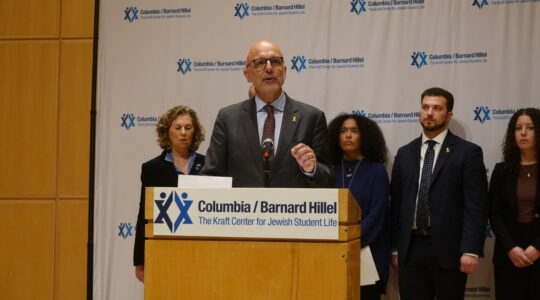Jerusalem — Israel’s Chief Rabbinate is being widely criticized for its newly released proposal that appears to consolidate its hold on overseas rabbinical courts that deal with conversion and divorce.
Critics fear the proposed criteria could place into question the legitimacy of hundreds, perhaps thousands, of Orthodox conversions and Jewish divorces performed outside of Israel.
If the criteria are approved by a final Chief Rabbinate council vote, Jews who have been converted or divorced in unrecognized diaspora rabbinical courts probably will not be able to marry via the rabbinate in Israel. Such converts may not be able to obtain a Jewish burial in Israel. In addition, a female convert’s children may not be recognized as Jewish. If a divorce is not recognized and a woman remarries, the rabbinate could, theoretically, say the children from her subsequent marriage are mamzerim, or bastards, the closest thing Judaism has to an untouchable. Mamzerim and their descendants, according to Jewish law, can only marry another mamzer or a convert.
Leaders of Orthodox rabbinic groups in the U.S. are being cautious in their official reactions. Rabbi Yona Reiss, head of the Beit Din of the Chicago Rabbinical Council, confirmed that his organization is “in the process of reviewing the proposed guidelines.” Rabbi Mark Dratch, executive director of the Rabbinical Council of America (RCA), the major Orthodox rabbinic organization in the U.S., said his group is “in conversation” with the rabbinate about the criteria.
An insider at the RCA said the group had requested to be consulted by the Chief Rabbinate’s 17-member committee dealing with the issue prior to making a decision but they were not. “We had no say,” he told The Jewish Week, “and part of the problem is they don’t understand how the American Jewish community works.”
The source explained that as a bureaucracy in Israel, the Chief Rabbinate seeks to rely on similar established Orthodox rabbinic courts in other countries, like in Europe. But the American Jewish community is more autonomous, he noted, with numerous rabbinic courts serving different geographic locations and a variety of religious viewpoints within Orthodoxy. He said that while the RCA is a key address, it is not the central address for dealing with conversions and divorce cases in the U.S.
Rabbi Seth Farber leads an Israeli organization, Itim, which seeks to help individuals through the maze of Chief Rabbinate-regulated services dealing with marriage, divorce, conversion and burial. He said the proposed criteria are the “first step” in the process to determine how and why the rabbinate recognizes the divorces and conversions performed by some diaspora rabbis and rabbinical courts but not others.
He added, however, that the rabbinate’s determination to centralize and streamline the diaspora rabbinical court system “completely takes away the autonomy” of local Orthodox communities in the diaspora and “delegitimizes” the rabbis who serve these communities.
His organization described the new criteria as “a power grab unprecedented in Jewish history, which shows profound ignorance of and disregard for the Jewish world and that will alienate Israel from world Jewry and threaten the unity of the Jewish people.”
Rabbi Farber noted that “traditionally, for hundreds of years, many conversions and divorces were effected by local and community rabbis.” For the first time, he said, there will be criteria explicitly stating that none of these other rabbinical courts has standing in the rabbinate’s eyes.
According to the new criteria, all divorces and conversions performed in the diaspora must be carried out in “permanent” rabbinical courts that specialize in these issues by rabbis who specialize in these issues — as opposed to courts that are convened when there is a particular case to deal with in a community.
If the rabbis who sit on these rabbinical courts have not had their credentials previously recognized (or had them rejected) by the rabbinate, they must pass rabbinate exams and otherwise meet the rabbinate’s approval.
Support the New York Jewish Week
Our nonprofit newsroom depends on readers like you. Make a donation now to support independent Jewish journalism in New York.
The draft criteria also stipulate that, except in “exceptional” cases, it will not recognize any new rabbinical courts in a municipality or region where an approved rabbinical court already exists. It will be up to the rabbinate to decide whether the creation of a new court is justified.
All rabbinical courts previously recognized by the rabbinate for the purposes of divorce and conversion are considered “kosher” and do not need to take any action to become certified.
Together these issues have the potential to create “an enormous fissure” between Orthodox Jews in the diaspora and the rabbinate, Rabbi Farber said.
Dr. Shuki Friedman, director of the Israel Democracy Institute’s Center for Nationality, Religion and State, told the Jerusalem Post that the criteria are “extremely problematic.”
“The principles establish de facto that the rabbinate is broadening its monopoly on marriage, divorce and conversion in the entire Jewish world, because many Jews, especially those who see themselves with a connection to the State of Israel and who may immigrate to Israel, will prefer to marry and divorce in courts recognized by the establishment in Israel,” Friedman said.
Rabbi Dratch from the RCA, whose rabbinical courts are already recognized by the rabbinate, believes that the criteria, once approved, will not nullify halachic conversions or divorces.
“I don’t think that the policy has changed. If the conversions or divorces were done properly by reliable authorities they should continue to be recognized,” he said.
Rabbi Reiss, from the Chicago Beit Din, similarly hopes that the new guidelines “will fundamentally serve to benefit individuals who have undergone valid conversions, divorces or other Jewish law processes through respected rabbinical courts” in the United States.
Reiss said that “building a strong spirit of cooperation” with the rabbinate is in the best interest of the Jewish people.”
Editor Gary Rosenblatt contributed to this report.




